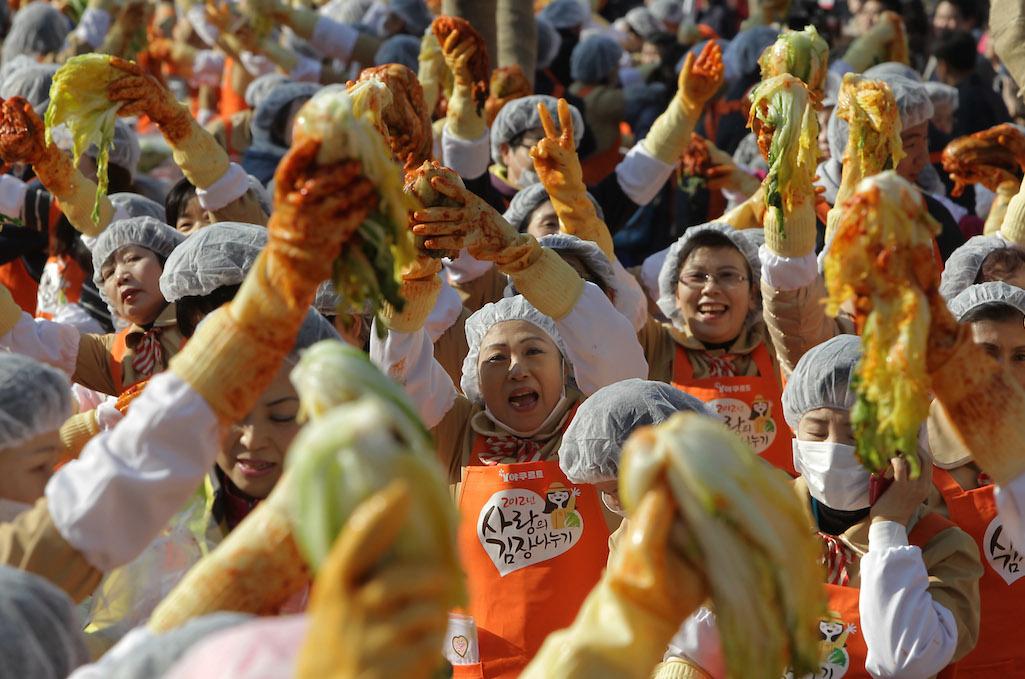Can kimchi cure Ebola?
No wonder they’re smiling!
SEOUL, South Korea — It’ll smack you in the face the instant you walk into any decent Korean restaurant: the pungent smell of kimchi — the piquant pickled cabbage whose bold tanginess is increasingly exalted by Western foodies.
For newbies, kimchi is a masochistic pleasure — like that first whack of wasabi from a heavy-handed sushi chef. You taste it. It hurts, bad. And you just keep going back for more.
But few souls outside Korea know that kimchi is actually incredibly nutritious and packed with health benefits. It’s one of those rare things in life that’s both sinfully good and good for you — sex (not NSFW) being another.
No joke.
Actual scientists have demonstrated that kimchi is good for you — really, really good for you.
Here’s the verdict, from a 2014 abstract in the Journal of Medicinal Food:
Health functionality of kimchi, based upon our research and that of other, includes anticancer, antiobesity, anticonstipation, colorectal health promotion, probiotic properties, cholesterol reduction, fibrolytic effect, antioxidative and antiaging properties, brain health promotion, immune promotion, and skin health promotion.
(Translation: this stuff is like Drano for what ails you.)
Yup, all that, from a spicy side dish — a treat that’s effectively the Korean equivalent of potato chips. Compare that to the impact of Salt and Vinegar Lays.
Better yet, it’s served for free in restaurants.
These days, Koreans, like the rest of us, are scared witless by the Ebola outbreak. On Aug. 5, a South Korean university even withdrew a conference invitation from three Nigerian students, sparking controversy in Seoul.
People here spend a lot of time talking about (and eating) their national super food. And as with past exotic disease outbreaks, they can be expected to boost their consumption of the spicy side dish.
Inevitably, a few Koreans are asking: Might kimchi be a hazmat suit disguised as a side dish? Might it effectively protect people against Ebola? So far, a number of claims have been scrutinized and roundly dismissed in the Korean media, which urge citizens to simply wash their hands.
Science be damned, some have brought up claims that kimchi has curative powers against an assortment of nasty infections such as SARS. During the 2005 bird flu outbreak, some of Korea’s most eminent scientists tried feeding kimchi to infected chickens. Within a week, most were getting better.
By now, you’re probably scratching your head. Little slices of fermented cabbage, fighting off a horrific, blood-soaked death from Ebola?
Yeah, that’s a stretch. If that were true, health authorities may want to consider adding it to the water supply.
Kimchi derives its magic from the wonders of fermentation, coupled with ingredients like garlic, capsaicin (the chemical that delivers the salivary jolt from hot peppers) and ginger, a tricolon that works together to boost physiological functions, helping prevent diabetes and heart disease, said Kim Hae Young, a food sciences professor at Yong In University in Gyeonggi province.
Koreans are uber-achievers, as demonstrated by their meteoric rise from sad poverty to Gangnam Style consumerism in recent decades. And history shows that kimchi has long been an integral part of Korean life, a dish as beloved as Ketchup is for Americans. While you may know kimchi as that red-colored fermenting cabbage smothered in pepper sauce and garlic, there are actually more than 100 varieties — take that Heinz.
Kimchi even drives the country’s international policy.
The South Korean government has embarked on an ostentatious food promotion campaign around the world, despite criticism from the budget office that the project has been ineffective and a waste of taxpayers’ money. There’s also an ongoing kimchi trade dispute with China, which supplies hundreds of thousands of tons of the stuff to this barren peninsula.
In anticipation of its first astronaut, the Korean government spent several years and millions of dollars developing a laboratory recipe it called “space kimchi.”
The motto: If Korea goes to space, kimchi must go too!
Middle-aged women gather for mass kimchi-making events that occasionally stink up the center of Seoul. The smell is worth bearing for a good cause. The vegetables are sometimes donated to supply poor households through the winter.
The soggy cabbage is also wielded here as a weapon of domestic disputes: The famed kimchi slap, a move recently popularized by a Korean television drama. Someone turning you blue with frustration? Smack them with a wet, dripping bulb of fermented cabbage. That’ll ensure they go home reeking up the subway, covered in a splash of red slimy stuff.
With kimchi so integral to Korean life, it’s no mistake that officials and even researchers have touted (and perhaps exaggerated) the benefits. In one stunt in 2010, at the height of the H1N1 outbreak, a giddy Korean advertiser handed out face masks in New York with a photograph of kimchi and the phrase “kimchi prevents swine flu.”
True or unproven nonsense? After all, kimchi failed to protect these 10,000 Koreans from swine flu. So while it’s certainly healthy, trust these claims at your own risk.
Max Kim contributed reporting.
Every day, reporters and producers at The World are hard at work bringing you human-centered news from across the globe. But we can’t do it without you. We need your support to ensure we can continue this work for another year.
Make a gift today, and you’ll help us unlock a matching gift of $67,000!
